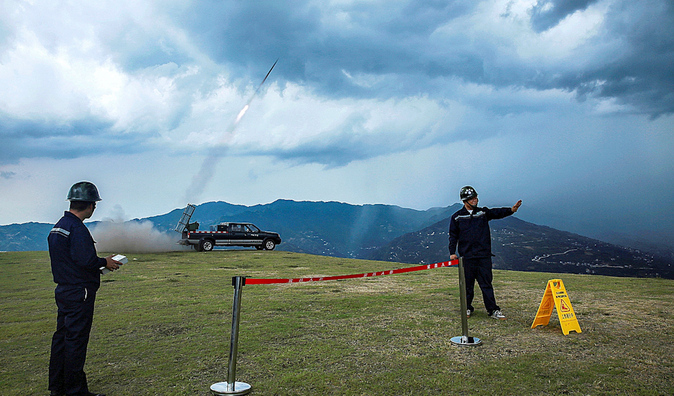In several Chinese regions around the
Yangtze
, Asia's longest river, planes are firing cannons into the sky, using silver iodide rods to
seed clouds
and try to
force rains
to quell the worst
drought
in living memory in the Asian giant. in more than 60 years.
Weather modification programs are spreading across the center and southwest of a country scorched by an unprecedented heat wave.
Blackouts in cities where millions of people live.
Factories that have to stop production to redirect the energy supply to homes.
Hydroelectric power reservoirs under minimum.
Orders not to lower air conditioning levels below 26ºC in government offices.
While
Europe
has already begun
energy saving plans
due to the scarcity of hydrocarbons, in
China
they are doing the same,
rationing electricity
, to withstand the summer heat wave.
The central province of Hubei, hit by drought since June, where more than 150,000 people have difficulty accessing drinking water and nearly 400,000 hectares of crops have been damaged by high temperatures, has been the latest to announce cloud seeding .
To know more
climate crisis.
"We have more heat waves, more frequent and longer due to climate change"
Writing: TERESA GUERREROMadrid
Writing: ÁNGEL DÍAZMadrid
"We have more heat waves, more frequent and longer due to climate change"
Science.
The climate faces 'the end game': "More than 2,000 million people will suffer extreme heat in 2070"
Drafting: CARLOS FRESNEDALondon
The climate faces 'the end game': "More than 2,000 million people will suffer extreme heat in 2070"
China has been trying to alter the climate since the middle of the last century, although it began applying its experiments to major events since Beijing hosted the
2008 Olympic Games
, in that case to ensure a dry climate in the capital during the celebration of the big sporting event.
Using satellites, planes, mobile radar stations and artificial intelligence, weather authorities try to
predict the movement of moist air
so they can execute cloud seeding operations, using
silver iodide rods
that are fired into the sky to help form silver crystals. ice, which push the cloud to produce more rain.
On Wednesday, the Weather Administration issued the
red alert
for heat in 138 cities, while another 373 localities remained under the orange alert, the second highest.
This week, the heat wave, with temperatures reaching 44°C in some provinces, lasted more than two months in a row.
Since records began in 1961, such a long wave has never been reported, hitting mostly all communities surrounding the
Yangtze River
, which is at record lows.
Sichuan
, in western China, with around 84 million, is the
most affected province
and where energy demand has skyrocketed the most.
The Hong Kong newspaper
South China Morning Post
(
SCMP
) explains that this province, the sixth largest economy in the country, depends on
dams
to generate around 80% of its electricity, but water flows to hydroelectric reservoirs
have been reduced by 50%
this month.
Local media have reported that the Sichuan authorities have requested that air conditioning levels in public offices be kept at no lower than 26ºC and that workers have been asked to use stairs instead of elevators whenever possible. .
In
Chongqing
, the province's largest city, they have announced that "
900 missiles
have been made available to try to seed clouds" and induce rain.
Sichuan has been suffering from
blackouts
in its factories for a couple of weeks.
Also in the cities.
For example, in Dazhou, home to more than five million people, blackouts last up to
three hours a day
.
Power outages are common in China to ration energy to endure the cold winter.
But the National Energy Administration warned in late July that the country's electricity load would continue to rise after repeatedly breaking the daily record last month.
The SCMP collects the latest data on energy consumption: it increased
by 6.3% in July
compared to the previous year, while residential energy consumption grew by
26.8%,
the highest rate since the first records were available .
Available July 2009.
On Wednesday, Vice Premier
Han Zheng
said that Beijing will offer assistance to
coal plants
to maintain electricity supply.
"We need to ensure secure power supply for people and key sectors. The government will enhance policy support and take multiple measures to help coal plants alleviate real difficulties," Han said after Chinese authorities warned. that daily fuel consumption by the country's power plants rose 15% in the first two weeks of August compared to the same period a year earlier.
Other measures announced by the authorities focus on
relocating livestock
from the provinces most affected by heat and drought, as well as increasing water discharges by 500 million cubic meters over the next 10 days at the Three Gorges Dam, the largest hydroelectric project in China.
THE YANGTZE DRIES UP
dropdown
The Yangtze River, which crosses eight Chinese provinces over 6,300 kilometers, supports around a third of the 1,400 million inhabitants of the Asian giant.
The severe heat wave in the river basin is lasting more than two months, reducing the supply of hydroelectric power and drying up large areas of arable land.
Water levels in the main body of the Yangtze are now at least 4.85 meters shallower than normal.
Rainfall in the river's drainage area fell by around 30% in July and is 60% lower than normal this August, with the river's tributaries "significantly lower" than historical levels, the Commission of Water Resources of the Yangtze River.
Nearly 820,000 hectares of arable land around the river have been damaged,
affecting 830,000 people and 160,000 head of cattle.
Authorities warn that the drought could last until September.
Conforms to The Trust Project criteria
Know more
Environment
China

